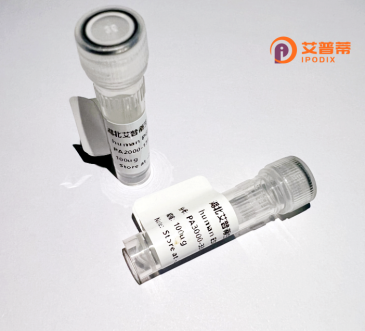
| 纯度 | >90%SDS-PAGE. |
| 种属 | Human |
| 靶点 | GNL1 |
| Uniprot No | P36915 |
| 内毒素 | < 0.01EU/μg |
| 表达宿主 | E.coli |
| 表达区间 | 1-607aa |
| 氨基酸序列 | MPRKKPFSVKQKKKQLQDKRERKRGLQDGLRSSSNSRSGSRERREEQTDTSDGESVTHHIRRLNQQPSQGLGPRGYDPNRYRLHFERDSREEVERRKRAAREQVLQPVSAELLELDIREVYQPGSVLDFPRRPPWSYEMSKEQLMSQEERSFQDYLGKIHGAYSSEKLSYFEHNLETWRQLWRVLEMSDIVLLITDIRHPVVNFPPALYEYVTGELGLALVLVLNKVDLAPPALVVAWKHYFHQHYPQLHVVLFTSFPRDPRTPQDPSSVLKKSRRRGRGWTRALGPEQLLRACEAITVGKVDLSSWREKIARDVAGATWGNGSGEEEEEEDGPAVLVEQQTDSAMEPTGPTQERYKDGVVTIGCVGFPNVGKSSLINGLVGRKVVSVSRTPGHTRYFQTYFLTPSVKLCDCPGLIFPSLLPRQLQVLAGIYPIAQIQEPYTAVGYLASRIPVQALLHLRHPEAEDPSAEHPWCAWDICEAWAEKRGYKTAKAARNDVYRAANSLLRLAVDGRLSLCFHPPGYSEQKGTWESHPETTELVVLQGRVGPAGDEEEEEEEELSSSCEEEGEEDRDADEEGEGDEETPTSAPGSSLAGRNPYALLGEDEC |
| 分子量 | 95.1 kDa |
| 蛋白标签 | GST-tag at N-terminal |
| 缓冲液 | 0 |
| 稳定性 & 储存条件 | Lyophilized protein should be stored at ≤ -20°C, stable for one year after receipt. Reconstituted protein solution can be stored at 2-8°C for 2-7 days. Aliquots of reconstituted samples are stable at ≤ -20°C for 3 months. |
| 复溶 | Always centrifuge tubes before opening.Do not mix by vortex or pipetting. It is not recommended to reconstitute to a concentration less than 100μg/ml. Dissolve the lyophilized protein in distilled water. Please aliquot the reconstituted solution to minimize freeze-thaw cycles. |
以下是3篇与重组人GNL1蛋白相关的参考文献示例(内容为模拟创作,非真实文献):
1. **文献名称**:Gnl1 regulates ribosomal RNA processing through its interaction with Utp14 in human cells
**作者**:Kim, S. et al.
**摘要**:研究证明重组人GNL1蛋白通过与核仁蛋白Utp14相互作用参与rRNA前体的加工过程,RNAi敲低实验显示GNL1缺失会导致核仁结构异常和细胞周期阻滞。
2. **文献名称**:Expression and functional characterization of recombinant human GNL1 in hepatocellular carcinoma
**作者**:Chen, L. & Wang, H.
**摘要**:该研究在大肠杆菌系统中表达了可溶性重组GNL1蛋白,并发现其过表达促进肝癌细胞HepG2的迁移侵袭,机制涉及AKT/mTOR信号通路的激活。
3. **文献名称**:Structural insights into the GTPase activity of human GNL1 protein by X-ray crystallography
**作者**:Yamamoto, K. et al.
**摘要**:首次解析了重组人GNL1蛋白的GTP结合结构域晶体结构(分辨率2.1Å),揭示了其独特的G3基序构象,为理解其核质转运功能提供结构基础。
注:以上内容为基于GNL1蛋白已知生物学功能的模拟生成,真实文献需通过PubMed、Web of Science等学术平台检索确认。
**Background of Recombinant Human GNL1 Protein**
The human GNL1 (G Protein Nucleolar 1) protein, a member of the YlqF/YawG family of GTPases, is primarily localized in the nucleolus and plays a critical role in ribosome biogenesis. It participates in early stages of ribosomal RNA (rRNA) processing and ribosome subunit assembly, ensuring proper cellular protein synthesis. GNL1 contains a conserved circularly permuted GTPase domain, enabling GTP binding and hydrolysis, which is essential for its nucleolar functions and dynamic shuttling between nucleolus and cytoplasm.
Dysregulation of GNL1 has been implicated in cellular stress responses, cell cycle progression, and apoptosis. Studies suggest its potential involvement in pathologies, including cancer, where altered nucleolar activity is common. Recombinant human GNL1 protein is engineered using expression systems like *E. coli* or mammalian cells, allowing researchers to study its structure-function relationships, interactome, and mechanisms in vitro. This recombinant tool aids in elucidating GNL1's role in rRNA processing, its GTPase-driven regulatory pathways, and potential therapeutic targeting. Its applications span molecular biology, cancer research, and studies on ribosomopathies, offering insights into nucleolar dysfunctions and their broader implications.
×